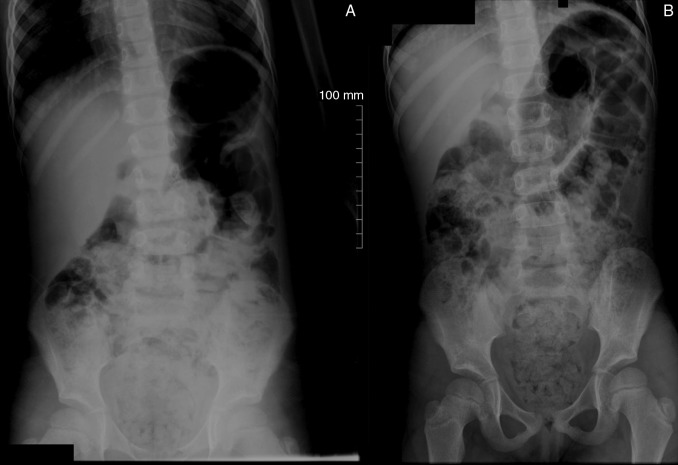Playlist
Show Playlist
Hide Playlist
Encopresis
-
Slides ToiletTrainingEnuresisEncopresis Pediatrics.pdf
-
Download Lecture Overview
00:01 Let’s switch gears now from enuresis to encopresis. 00:05 This is when patients have either daytime or nighttime soiling beyond the age of toilet training typically after four years. 00:14 There are a few causes of this. 00:16 One is chronic constipation. 00:18 Generally, in patients with severe constipation and they may have a larger stool volume that’s needed to show that they need to defecate. 00:29 In other words, they develop such a large stool burden, that the colon dilates and then it requires a larger stool burden to even know that you have to use the bathroom. 00:40 This results in a viscous cycle where they may develop a large stool ball at the end of the rectal vault. 00:48 Then, liquid stool can slip around the side and cause a small amount of leakage that is consistent with soiling. 00:58 Additionally, patients may have emotional stressors. 01:00 They have emotional problems that can result them to voluntarily withhold as a result of an expression of their emotional distress. 01:08 So we should investigate that. 01:11 One sign of encopresis is skid marks or streaking of the stool in the underwear. 01:16 This is from that liquid sweeping around a rectal ball. 01:22 Also, if patients have large stools, which clog the toilet, that may be a sign that they have encopresis. 01:28 Or they may develop abdominal pain that’s typically at night and a decrease in appetite. 01:34 How do we treat encopresis? Well, the first is polyethylene glycol. 01:40 Polyethylene glycol can be given by mouth or by rectum. 01:44 By rectum, it’s effective at releasing that distal stool ball. 01:48 And by mouth, it’s a very effective softener of stool. 01:52 In large doses, it can be very effective at relieving intestinal blockage and that’s what we’ll do in the hospital when we give it by nasal gastric tube in large volumes very fast. 02:03 Patients may also go on stool softeners. 02:06 Other stool softeners are fine, too, like Colace. 02:08 It doesn’t really matter what you use. 02:10 Find what’s good for that family. 02:13 And enemas are important for relieving a distal obstruction, especially in patients who have true encopresis or the liquids sweeping around a rectal stool ball. 02:22 In severe cases, patients may require inpatient administration of large volumes of NG polyethylene glycol for what we call a clean out. 02:32 This is important in patients where we really can’t get them totally clear. 02:37 The reason why this is important is that if that stool ball isn’t relieved, they will just continue having that viscous cycle of withholding and pain. 02:46 We have to clean them out and start again. 02:49 So when we’ve cleaned them out and they’re ready to start again or if we’ve cleared the distal ball with an enema or some oral polyethylene glycol, we generally want to start a new regimen of toilet behavior. 03:03 What we’ll do is we’ll recommend twice a day, they sit on the toilet for a half hour whether they have to go or not. 03:10 Again, this has to be a positive experience and that could be challenging. 03:14 Give them a screen device like an iPad or read them a book during that period so they know this is going to be a positive thing. 03:23 Give them a reward for when they successfully poop in the potty. 03:27 Don’t punish them. 03:29 And provide them with a high fiber diet and additionally, stool softeners if needed to make sure that the experience isn’t painful. 03:38 If there’s a psychological stressor that’s playing into this, it’s important to arrange for psychological counselling for the child. 03:45 It’s important especially if this is a psychological withholding rather than pure constipation. 03:52 So that’s my review of toileting behaviors in children. 03:56 Thanks for your time.
About the Lecture
The lecture Encopresis by Brian Alverson, MD is from the course Child Development and Behavior.
Included Quiz Questions
Which of the following is a good treatment option for constipation?
- Polyethylene glycol
- Low fiber diet
- Punishment for accidents
- Enforced toilet sitting once a day
- Ipecac
How old must a child be to be diagnosed with encopresis?
- > 4 years old
- < 3 years old
- > 5 years old
- < 2 years old
- < 3.5 years old
A 7-year-old boy is suffering from encopresis. Initially, stool softeners were used, but with little improvement. What should be considered when etiology is psychological?
- The child should be rewarded when successfully completing a trip to the bathroom.
- Stool softeners should be repeated.
- Enemas should be tried.
- Poly ethylene glycol should be immediately administered.
- Lactulose is a good therapeutic option.
Customer reviews
5,0 of 5 stars
| 5 Stars |
|
5 |
| 4 Stars |
|
0 |
| 3 Stars |
|
0 |
| 2 Stars |
|
0 |
| 1 Star |
|
0 |




